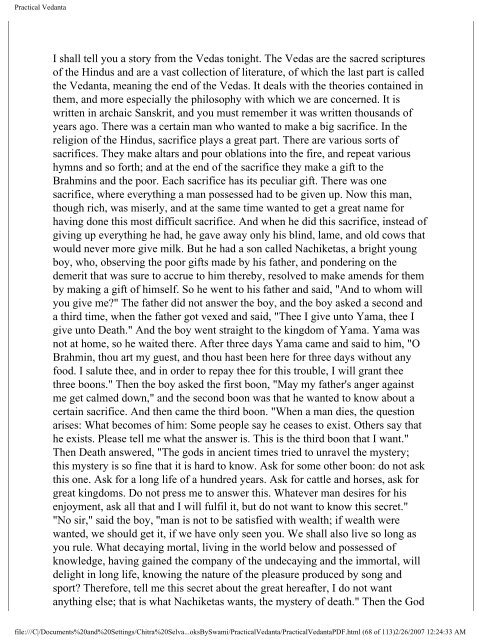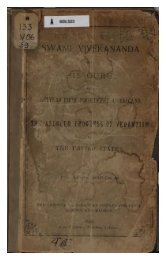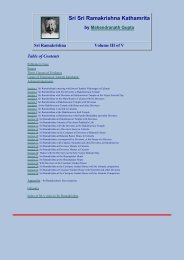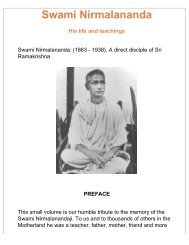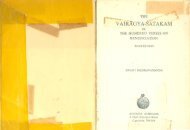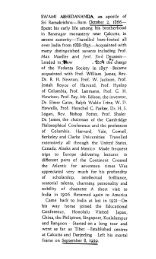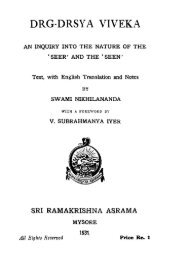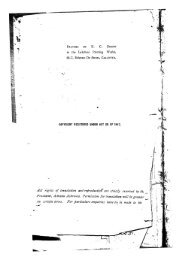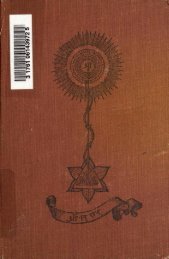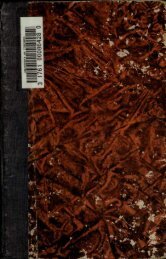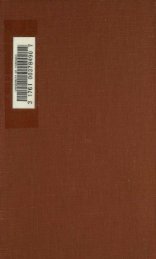<strong>Practical</strong> <strong>Vedanta</strong>I shall tell you a story from the Vedas tonight. The Vedas are the sacred scripturesof the Hindus and are a vast collection of literature, of which the last part is calledthe <strong>Vedanta</strong>, meaning the end of the Vedas. It deals with the theories contained inthem, and more especially the philosophy with which we are concerned. It iswritten in archaic Sanskrit, and you must remember it was written thousands ofyears ago. There was a certain man who wanted to make a big sacrifice. In thereligion of the Hindus, sacrifice plays a great part. There are various sorts ofsacrifices. They make altars and pour oblations into the fire, and repeat varioushymns and so forth; and at the end of the sacrifice they make a gift to theBrahmins and the poor. Each sacrifice has its peculiar gift. There was onesacrifice, where everything a man possessed had to be given up. Now this man,though rich, was miserly, and at the same time wanted to get a great name forhaving done this most difficult sacrifice. And when he did this sacrifice, instead ofgiving up everything he had, he gave away only his blind, lame, and old cows thatwould never more give milk. But he had a son called Nachiketas, a bright youngboy, who, observing the poor gifts made by his father, and pondering on thedemerit that was sure to accrue to him thereby, resolved to make amends for themby making a gift of himself. So he went to his father and said, "And to whom willyou give me?" The father did not answer the boy, and the boy asked a second anda third time, when the father got vexed and said, "Thee I give unto Yama, thee Igive unto Death." And the boy went straight to the kingdom of Yama. Yama wasnot at home, so he waited there. After three days Yama came and said to him, "OBrahmin, thou art my guest, and thou hast been here for three days without anyfood. I salute thee, and in order to repay thee for this trouble, I will grant theethree boons." Then the boy asked the first boon, "May my father's anger againstme get calmed down," and the second boon was that he wanted to know about acertain sacrifice. And then came the third boon. "When a man dies, the questionarises: What becomes of him: Some people say he ceases to exist. Others say thathe exists. Please tell me what the answer is. This is the third boon that I want."Then Death answered, "The gods in ancient times tried to unravel the mystery;this mystery is so fine that it is hard to know. Ask for some other boon: do not askthis one. Ask for a long life of a hundred years. Ask for cattle and horses, ask forgreat kingdoms. Do not press me to answer this. Whatever man desires for hisenjoyment, ask all that and I will fulfil it, but do not want to know this secret.""No sir," said the boy, ''man is not to be satisfied with wealth; if wealth werewanted, we should get it, if we have only seen you. We shall also live so long asyou rule. What decaying mortal, living in the world below and possessed ofknowledge, having gained the company of the undecaying and the immortal, willdelight in long life, knowing the nature of the pleasure produced by song andsport? Therefore, tell me this secret about the great hereafter, I do not wantanything else; that is what Nachiketas wants, the mystery of death." Then the Godfile:///C|/Documents%20and%20Settings/Chitra%20Selva...oksBySwami/<strong>Practical</strong><strong>Vedanta</strong>/<strong>Practical</strong><strong>Vedanta</strong>PDF.html (68 of 113)2/26/2007 12:24:33 AM
<strong>Practical</strong> <strong>Vedanta</strong>of death was pleased. We have been saying in the last two or three lectures thatthis Jnâna prepares the mind. So you see here that the first preparation is that aman must desire nothing else but the truth, and truth for truth's sake. See how thisboy rejected all these gifts which Death offered him; possessions, property,wealth, long life, and everything he was ready to sacrifice for this one idea,knowledge only, the truth. Thus alone can truth come. The God of death becamepleased. "Here are two ways," he said, "one of enjoyment, the other ofblessedness. These two in various ways draw mankind. He becomes a sage who,of these two, takes up that which leads to blessedness, and he degenerates whotakes up the road to enjoyment. I praise you, Nachiketas; you have not asked fordesire. In various ways I tempted you towards the path of enjoyment; you resistedthem all, you have known that knowledge is much higher than a life of enjoyment."You have understood that the man who lives in ignorance and enjoys, is notdifferent from the brute beast. Yet there are many who, though steeped inignorance, in the pride of their hearts, think that they are great sages and go roundand round in many crooked ways, like the blind led by the blind. This truth,Nachiketas, never shines in the heart of those who are like ignorant children,deluded by a few lumps of earth. They do not understand this world, nor the otherworld. They deny this and the other one, and thus again and again come under mycontrol. Many have not even the opportunity to hear about it; and many, thoughhearing, cannot know it, because the teacher must be wonderful; so must he bewonderful too unto whom the knowledge is carried. If the speaker is a man who isnot highly advanced, then even a hundred times heard, and a hundred times taught,the truth never illumines the soul. Do not disturb your mind by vain arguments,Nachiketas; this truth only becomes effulgent in the heart which has been madepure. He who cannot be seen without the greatest difficulty, He who is hidden, Hewho has entered the cave of the heart of hearts — the Ancient One — cannot beseen with the external eyes; seeing Him with the eyes of the soul, one gives upboth pleasure and pain. He who knows this secret gives up all his vain desires, andattains this superfine perception, and thus becomes ever blessed. Nachiketas, thatis the way to blessedness. He is beyond all virtue, beyond all vice, beyond allduties, beyond all non-duties, beyond all existence, beyond all that is to be; hewho knows this, alone knows. He whom all the Vedas seek, to see whom menundergo all sorts of asceticism, I will tell you His name: It is Om. This eternal Omis the Brahman, this is the immortal One; he who knows the secret of this —whatever he desires is his. This Self of man, Nachiketas, about which you seek toknow, is never born, and never dies. Without beginning, ever existing, thisAncient One is not destroyed, when the body is destroyed. If the slayer thinks thathe can slay, and if the slain man thinks he is slain, both are mistaken, for neithercan the Self kill, nor can It be killed. Infinitely smaller than the smallest particle,infinitely greater than the greatest existence, the Lord of all lives in the cave of theheart of every being. He who has become sinless sees Him in all His glory,through the mercy of the same Lord. (We find that the mercy of God is one of thefile:///C|/Documents%20and%20Settings/Chitra%20Selva...oksBySwami/<strong>Practical</strong><strong>Vedanta</strong>/<strong>Practical</strong><strong>Vedanta</strong>PDF.html (69 of 113)2/26/2007 12:24:33 AM
- Page 1 and 2:
Practical VedantaPractical VedantaP
- Page 3 and 4:
Practical Vedantaworld. If I am a s
- Page 5 and 6:
Practical Vedantadifference is only
- Page 7 and 8:
Practical VedantaThe ideal of faith
- Page 9 and 10:
Practical Vedantamoment of our live
- Page 11 and 12:
Practical Vedantaof the Christs and
- Page 13 and 14:
Practical Vedanta"This life is Brah
- Page 15 and 16:
Practical Vedantadark fifteen days,
- Page 17 and 18: Practical Vedantalife. This is the
- Page 19 and 20: Practical Vedantaeverything would b
- Page 21 and 22: Practical Vedantait is only through
- Page 23 and 24: Practical Vedantawhich is that subt
- Page 25 and 26: Practical Vedantanoumenon and pheno
- Page 27 and 28: Practical Vedantato which is the be
- Page 29 and 30: Practical VedantaAbsolute.The finit
- Page 31 and 32: Practical Vedantawhich is not the q
- Page 33 and 34: Practical Vedantaexperience that th
- Page 35 and 36: Practical Vedantafulfilled. The Jiv
- Page 37 and 38: Practical Vedantabetween the pure r
- Page 39 and 40: Practical Vedantacome out straight.
- Page 41 and 42: Practical Vedantawar with one anoth
- Page 43 and 44: Practical Vedantanobody could under
- Page 45 and 46: Practical VedantaMy idea, therefore
- Page 47 and 48: Practical Vedantathe same methods.
- Page 49 and 50: Practical Vedantavarious minds, all
- Page 51 and 52: Practical Vedantabrotherhood; but t
- Page 53 and 54: Practical Vedantabrotherhood, but w
- Page 55 and 56: Practical Vedantawe all go with ves
- Page 57 and 58: Practical Vedantareason. What can y
- Page 59 and 60: Practical Vedantabeen preached in t
- Page 61 and 62: Practical Vedantathe husband kisses
- Page 63 and 64: Practical Vedantaof the knowledge a
- Page 65 and 66: Practical Vedantafor those who only
- Page 67: Practical Vedantasun exists because
- Page 71 and 72: Practical VedantaGod. We must learn
- Page 73 and 74: Practical Vedantaa plague comes, it
- Page 75 and 76: Practical VedantaAtman? "As with a
- Page 77 and 78: Practical Vedantathat immortal One,
- Page 79 and 80: Practical Vedantaand the third egoi
- Page 81 and 82: Practical VedantaWitness of the uni
- Page 83 and 84: Practical VedantaPractical Vedanta1
- Page 85 and 86: Practical Vedantaeternal ; every ot
- Page 87 and 88: Practical Vedantafaculty, Buddhi, w
- Page 89 and 90: Practical VedantaPractical Vedanta1
- Page 91 and 92: Practical Vedantastepping-stone to
- Page 93 and 94: Practical Vedantarecognition? Findi
- Page 95 and 96: Practical Vedantasentient." This is
- Page 97 and 98: Practical Vedantaessentially differ
- Page 99 and 100: Practical Vedantaexistence is limit
- Page 101 and 102: Practical Vedantalive, for I am lif
- Page 103 and 104: Practical Vedantasee from Kapila's
- Page 105 and 106: Practical Vedantalimitation, but th
- Page 107 and 108: Practical Vedantaperfect, infinite,
- Page 109 and 110: Practical Vedantaindividuality, of
- Page 111 and 112: Practical Vedantarepeat [something]
- Page 113: Practical Vedantaperson who dies in


